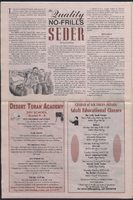Search the Special Collections and Archives Portal
Search Results

Interview with Native American Forum on Nuclear Issues, April 10, 2008
Date
Archival Collection
Description
Text

Transcript of interview with Florence McClure by Joanne Goodwin, January 24, 1996 & February 6, 1996
Date
Archival Collection
Description
Florence McClure came to Las Vegas later in her life, but the state felt her presence and the community her contributions as if she were a native daughter. Introduced to the League of Women Voters in 1967, McClure met her political mentor Jean Ford and learned how to practice the core elements of democracy. She put those tools to work in a number of ways, however her participation in the creation of the Rape Crises Center and her advocacy for locating the women’s prison near Las Vegas are two of her long-lasting efforts. Florence Alberta Schilling was born in southern Illinois where she enjoyed the security of a tight-knit family and the independence to test her abilities growing up. She graduated from high school and attended the MacMurray College for Women at Jacksonville. With the attack on Pearl Harbor in 1941, she began a series of jobs working for the war effort. She moved to Ypsilanti, Michigan with a girlfriend to work at the Willow Run Army Airbase and then moved to Miami, Florida where she worked for the Provost Marshall in the Security and Intelligence Division. She met her husband, James McClure, at the time and they married in 1945. During the next several years, they raised a family and moved around the country and to Japan with the military. McClure came to Las Vegas in 1966 as part of her work in the hotel industry which she engaged in after her husband’s retirement from the military. She had worked in California and Miami Beach, but it was Burton Cohen in Los Angeles who invited her to join him in a move to Las Vegas to build the new Frontier Hotel and Casino. Following the completion of the Frontier, she moved to the Desert Inn with Cohen in 1967 and worked as the executive office manager. After a few years, she decided to leave the industry and complete her college education. She graduated from UNLV in 1971with a BA in Sociology with an emphasis on criminology. She was 50 years old. McClure had been a member of the League of Women Voters for a few years at that point and had learned the political process from Jean Ford and workshops on lobbying. She had numerous skills that were waiting to be tapped when she attended an informational meeting on the incidence of rape in the Las Vegas valley. From that meeting, a small group of individuals, including McClure, began the organization Community Action Against Rape (later renamed the Rape Crisis Center) in 1973. It was the first agency in the area devoted to serving individuals who had been assaulted and changing the laws on rape. The organization’s first office was set up in McClure’s home. Over the next decade, she worked to change attitudes and reshape policy by constantly raising the issues of sexual assault with police officers, emergency room doctors, judges, and legislators. Her role as an advocate took her into hospital emergency rooms and courtrooms to assist victims. It also took her to the state legislator to lobby repeatedly for a change in laws. During this period, journalist Jan Seagrave gave McClure the nickname “Hurricane Florence” - a fitting moniker that captured the force with which McClure attacked the issue. As a result of her efforts and those of the people with whom she worked, we now 1) recognize rape as a crime of assault; 2) forbid the sexual history of a rape victim from being used against her in court; and 3) recognize marital rape. In addition to learning about Florence McClure’s activities, the reader of this interview will gain information on the role of civic organizations like the League of Women Voters in engaging the voluntary efforts of women in the post-war years.
Text

Angela Castro oral history interview: transcript
Date
Archival Collection
Description
Oral history interview with Angela Castro conducted by Stefani Evans, Cecilia Winchell, Kristel Peralta, Vanessa Concepcion, and Ayrton Yamaguchi on November 05, 2020 for the Reflections: The Las Vegas Asian American and Pacific Islander Oral History Project. Castro begins the interview by talking about her early life, childhood, what Guam was like, and the history of her parents and grandparents. She describes the difference in public and private education in Guam and compares it to the United States. She explains the reason why she moved to Las Vegas, Nevada in 1998 and attended the University of Nevada, Las Vegas for public relations. Castro then talks about the differences between older and newer generations, the political atmosphere in Guam, and the differences between the United States and Guam in politics. She also talks about the discrimination she has experienced throughout her life and diversity in the workplace. Lastly, she describes her culture and traditions during holidays, the struggles with an absence of culture within her family, and her personal religious beliefs.
Text

Interview with Robert Elmer Friedrichs, June 18, 2004
Date
Archival Collection
Description
Text
Tonopah Mining Company Records
Identifier
Abstract
The Tonopah Mining Company Records derive from the office of the company’s general manager in Tonopah, Nevada and consist of documents directly generated by its mining and milling operations from 1901 through 1941. The collection includes daily work reports, assay reports and certificates, employee time cards, invoices and receipts for mining equipment and supplies, monthly stores reports, and the company’s numerous insurance policies. Several of the company’s annual reports, including an original typescript copy of the 1907 annual report, are included in the collection. Additionally, select records from the company's subsidiary, Desert Power and Mill Company, as well as the Tonopah and Goldfield Railroad, which include overcharge claims, freight and repair bills, and delivery receipts are included in the collection.
Archival Collection
Southern Nevada Jewish Heritage Project Community Collection
Identifier
Abstract
The Southern Nevada Jewish Heritage Project Community Collection is comprised of organizational records, photographs, event programs, and ephemera donated by members of the Southern Nevada Jewish community as part of the University of Nevada, Las Vegas University Libraries’ Southern Nevada Jewish Heritage Project. Materials document the history of the Jewish community and Southern Nevada from 1941 to 2017. The collection provides information about family life, religious rituals, community events, and local businesses and organizations.
Archival Collection
Florence Lee Jones Cahlan Photographs
Identifier
Abstract
The Florence Lee Jones Cahlan Photographs depict locations and events in Las Vegas, Nevada from 1909 to 1980. The photographs primarily depict historical locations, including the Las Vegas Mormon Fort, the Kiel Ranch, and plaques commemorating Las Vegas’s 75th anniversary. The photographs also depict celebrations, including the Diamond Jubilee festivities held to celebrate Las Vegas’s 75th anniversary, plaque dedications, building dedications, and the 50th anniversary of the arrival of the first mail planes in Las Vegas. The photographs include the Kennecott Copper Corporation’s facilities in McGill, Nevada, Western Airlines planes and pilots, and Union Pacific Railroad locomotives.
Archival Collection
Art Wolf Professional Papers
Identifier
Abstract
The Art Wolf Professional Papers (1988-2018) document the career of museum professional and consultant Art Wolf who specialized in supporting cultural heritage of indigenous communities, particularly in the Southwest and Las Vegas, Nevada. Materials document Wolf's work with the American Alliance of Museums (AAM) as a board member, in conference planning, and as a Study Leader for Smithsonian Associates Study Tours. Also included are materials that represent Wolf's involvement as an alumni of the Leadership Las Vegas program and director of the Nevada State Museum. The collection includes some ephemera and invitations to different events held in Las Vegas, Nevada that Wolf was invited to. The collection also includes examples of unsuccessful bids for consultancy jobs through WOLF Consulting and his files as a master's thesis adviser for the Museum Studies program at Harvard Extension School.
Archival Collection


